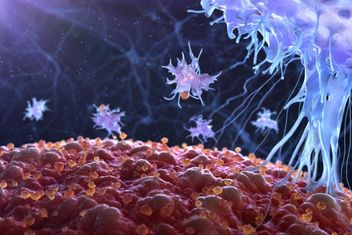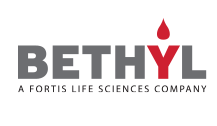The Immune System and Antibody Response
Immunology is the study of the cellular and molecular components that make up the immune system. This system creates coordinated responses to combat infection and disease. The immune response can be classified into two parts. Innate immunity, which acts as the first line of defense, reacts quickly and relatively nonspecifically, and includes NK cells, dendritic cells, neutrophils, macrophages, and myeloid cells, especially at barrier surfaces such as the skin and mucosa. Adaptive immunity, which creates more specific, long-lasting and systemic responses, involves T cells and B cells.
The human body has a variety of microenvironments that create specific niches of the immune system. For example, the intestinal immune system is partially generated by the presence of commensal gut bacteria and is fine tuned to deal with this environment full of microbes. Immunology, however, is not limited to interactions with microbes and foreign invaders, but also includes processes that can determine outcomes for disease states like cancer and neurodegenerative diseases. The immune system also regulates itself to protect healthy, non-diseased tissues from damage; when this process goes awry, autoimmune diseases are the result. These niche environments and dynamic processes create a plethora of research opportunities in the field of immunology.
Our robust portfolio of antibodies for immunology applications includes tools for IHC/IF/ICC, ISH, ELISA, Western blotting, flow cytometry, and other immunoassays to fit your specific immunology research needs. All of our antibodies are manufactured and validated in-house.

Additional Resources:
-
Rabbit anti-PSMD9 Antibody
Bethyl Laboratories® Catalog # A304-979A-T A304-979A
 ValidatedDocuments (3)
ValidatedDocuments (3)Rabbit anti-PSMD9 Antibody
Validation Performed
All Bethyl Laboratories® antibodies are validated to meet our strict performance standards.
Target: PSMD9
Reactivity: Human, Mouse
Applications:
Host: Rabbit
Clonality: Polyclonal
Conjugate:
Purity:
For ordering information, see our International Distributors
Product has been discontinued
-
Rabbit anti-p300 Antibody
Bethyl Laboratories® Catalog # A300-359A-T A300-359A
 ValidatedDocuments (5) Citations ()
ValidatedDocuments (5) Citations ()Rabbit anti-p300 Antibody
Validation Performed
All Bethyl Laboratories® antibodies are validated to meet our strict performance standards.
Target: p300
Reactivity: Human
Applications:
Host: Rabbit
Clonality: Polyclonal
Conjugate:
Purity:
For ordering information, see our International Distributors
Product has been discontinued
-
Rabbit anti-APC7 Antibody
Bethyl Laboratories® Catalog # A302-551A A302-551A-T
 ValidatedDocuments (4) Citations ()
ValidatedDocuments (4) Citations ()Rabbit anti-APC7 Antibody
Validation Performed
All Bethyl Laboratories® antibodies are validated to meet our strict performance standards.
Target: APC7
Reactivity: Human, Mouse
Applications:
Host: Rabbit
Clonality: Polyclonal
Conjugate:
Purity:
For ordering information, see our International Distributors
Product has been discontinued
-
Rabbit anti-DYNC1I2 Antibody
Bethyl Laboratories® Catalog # A304-528A-T A304-528A
 ValidatedDocuments (5)
ValidatedDocuments (5)Rabbit anti-DYNC1I2 Antibody
Validation Performed
All Bethyl Laboratories® antibodies are validated to meet our strict performance standards.
Target: DYNC1I2
Reactivity: Human
Applications:
Host: Rabbit
Clonality: Polyclonal
Conjugate:
Purity:
For ordering information, see our International Distributors
Product has been discontinued
-
Rabbit anti-4EBP1 Antibody
Bethyl Laboratories® Catalog # A300-501A-T A300-501A
 ValidatedDocuments (4) Citations ()
ValidatedDocuments (4) Citations ()Rabbit anti-4EBP1 Antibody
Validation Performed
All Bethyl Laboratories® antibodies are validated to meet our strict performance standards.
Target: 4EBP1
Reactivity: Human
Applications:
Host: Rabbit
Clonality: Polyclonal
Conjugate:
Purity:
For ordering information, see our International Distributors
Product has been discontinued
Bulk Request


